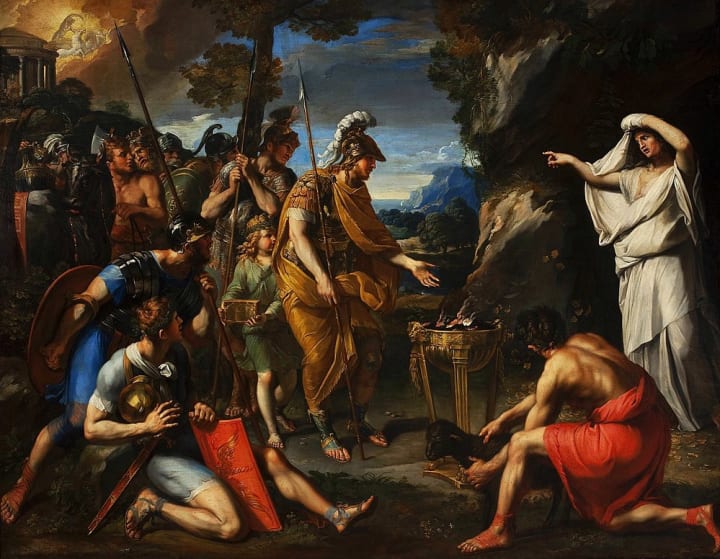Top 10 Prophets, 👁👁 Prognosticators, & Visionaries #1
1) The Oracle of Delphi & 2) the Sibyls of Rome ⚡

In the book Future Shock, Alvin Toffler wrote…
“We offer our children courses in history; why not courses in ‘Future’?”
Right?!? 🤷🏻♂️
If only!
Tomorrow always remains unwritten... until it becomes today. 👀 Seeing beyond the present moment is impossible!
Or is it?

In chronological order, this series will profile famous farseeing futurologists! ⚡😁👍 They were mysterious, intimidating, sometimes nearly unfathomable. They were also immensely popular. Offering answers in troubled times (and all times are always troubled), we wonder: were they psychic? Divine? Just extraordinarily imaginative? Borderline insane?
This is my ⚡ lightning list of the Top Ten Visionaries of all time!

#1) The Oracle of Delphi— from about 700 B.C. to A.D. 362
According to ancient Greek myth, the King of the Gods, Zeus, once commanded two eagles to fly around the earth, sending one to the north and one to the south. Where the two eagles finally converged was deemed the center of the world, the most beautiful vista in all of Greece.
That was Delphi.
Originally, the rocky terrain was a place where goats thrived. But then one troubled day, a massive earthquake broke open a natural chasm, from which strange gasses escaped. Goats— then the goatherders— started acting freakishly.
A period of chaos followed. People flocked to the site, where they often became overwhelmed by the vapors. Many started speaking in completely different voices. (Formerly, even the braying of the goats had been distorted, when the animals were subjected to the fumes). Other visitors went into trances. A few Greeks died falling into the pit.
Around 700 B.C., construction began on the stone temple of Apollo, the god of truth and prophecy. A single young woman was appointed by the locals to act as Apollo’s mouthpiece. She would breathe the vapors emanating from below, which would then allow the deity to speak through her. A three-legged stool was constructed for her to sit directly above the churning smoke. She was called the Dragon Priestess of Earth— the Pythia— in honor of a dragon-serpent named Python, who was believed to have been slain by Apollo at that site.

Soon after the Oracle was established at Delphi, one of the first prophetesses was kidnapped and raped. After that shocking incident, it was decided it was safer to choose more aged women for the role.
Deep faith, good health, and honorable behavior became the qualifications for these wise-women. Once tested and chosen, the Pythia purified herself daily. Even the sturdiest women still didn’t live long after taking the job. In one instance, a entranced oracle threw herself to the ground so violently, she later died.

The height of Delphi’s fame occurred in the fifth century B.C..
By then, two priestesses were constantly kept busy answering querents, with a third on standby. The prophetesses spoke in gravelly voices, rambled obscurities, shrieked uncontrollably, sometimes even barked. It was the role of male priests to act as translators. These men were always present, but they weren’t prophets themselves; they were just highly educated in interpretation.
Great care was given to predictions, especially when responding to mighty rulers. One King in the 600s B.C. tried to trick a Pythia. He sent messengers to Delphi to ask this question…
“What will the King be doing in his palace one hundred days after his messengers leave?”
One hundred days later, King Croesus did the most bizarre, unlikely thing he could imagine. He chopped up a tortoise and a lamb, broiling both in a bronze pot that he covered up to make certain no one could look inside.
The Pythia sent back her astonishing response...
“I know the number of grains of sand, and all the measures of the sea. I understand the dumb, and the speechless I hear. The smell has come to my nostrils of a hard-skinned tortoise as it is boiled with lamb’s flesh in a covered vessel, all of bronze.”
Astonished, King Croesus sent gifts of gratitude, including pearl robes, gold statues, and a gigantic golden bowl big enough to hold five thousand gallons of wine. He offered three hundred sacrificial animals to Apollo.

When Alexander the Great was on his quest to conquer all the known world, he eventually arrived in Delphi... and bad luck, wouldn't you just know it? He was told the Pythia wasn’t prophesying on the day that he was in town! Furious, Alexander went to the oracle’s home, intent on dragging her to the temple. When she saw him, she told the conqueror, “You are invincible, my son.” He left after that, apparently having heard exactly what he wanted to hear.
When the infamous Roman emperor Nero went to Delphi, he received this message…
“Your presence outrages me. Begone, matricide! Beware of seventy-three!”
Since he was thirty, Nero accepted this as good news, thinking he’d live another forty-three years. Still, he had murdered his own mother and he was enraged about being called out for it. Go figure? 🤷🏻♂️ Nero ordered the prophetess and the attending male priests to be seized, and for their hands and feet to be cut off. Then, to add insult to injury, they were all buried alive. Feeling better about himself after that, Nero took five hundred of Delphi’s finest statues and returned to Rome. He died just a year later. His successor, Galba, was seventy-three-years-old.

Ancient Greek thinkers questioned everything... but they trusted Delphi. Socrates, Greek’s most intellectual philosopher wholeheartedly endorsed the Pythia. Of course, the Oracle did declare him “the wisest of men,” so, you know—he might have been a little bit prejudicial in his opinion.
There were no rational explanations for the oracle’s accuracy. Yes, in some cases, vague answers were given that could be interpreted in many different ways. But in other instances, the Pythia's precision was uncanny. And the auguries were wide-ranging. Beyond the personal predictions, political prognostications influenced ruling empires. For many powerful reasons, Delphi’s influence prevailed for more than a thousand years.
Roughly 362 years after the birth of Jesus, a prophecy was given to the Roman emperor Julian, the last emperor to oppose Christianity. The Oracle of Delphi foretold her own demise…
“The voice is stilled.”

#2) The Sibyls of Rome— from around 1200 B.C. to A.D. 83
All roads did lead to Rome.
At the Empire’s peak, one fifth of all humanity were subject to magisterial law and paid taxes to the emperor. Having outgrown Italy, Romans went on to conquer parts of Africa, Asia, the Middle East, and all of Southern Europe. In the city of Rome, a cruel society flourished, based on violence. Hundreds of amphitheaters featured gladiators who fought in gory spectacles. Disposable slaves generally outnumbered the citizens; they could be sold, tortured, or killed based on their owner’s whims. Women had no rights and were always vulnerable. If a man wanted to own property, he had to serve sixteen years in the brutal Roman army.
At its peak, the population of the Imperial City was nearly a million people.
Life was tumultuous and cruel. Besides natural disasters and high taxes, a citizen constantly had to worry about the dispositions of all the many gods. Pissing them off was easy. Pleasing them was very hard.
Luckily, a Roman could find help in troubled times: predictions made by women called Sibyls.

No one ever actually laid eyes on one of these oracles, but their fame was legendary. A sibyl drank bull’s blood, a deadly poison, to enter a strange trance. It was reported sibyls lived to be 110 years old, perhaps even centuries older. As they aged, they shrank. Some were believed to fit inside flasks, essentially becoming nothing but intonations in a bottle. They spoke in odd voices, but their wisdom was undeniable. Their predictions allowed querents to plan ahead.
The earliest reference to a sibyl comes from what is now Turkey in 1200 B.C.. The prophetess claimed to be a demigoddess.
“I am born betwixt a mortal and a god, of an immortal nymph and a father feeding on bread.”
She predicted the Trojan War. And she further foretold that the Greek poet Homer would use her verses when he wrote the Iliad and the Odyssey.
A typical woman of this era went straight from her father’s authority to that of her husband. A female's assigned role was childbearing and homemaking. Sibyls, on the other hand, were uncommon. They lived independently, were allowed to earn money, and were encouraged to cultivate their awareness of others. Over generations, mystic knowledge was passed from priestess to priestess, in secret ceremonies now lost to time.
High on a red volcanic hill overlooking the sea, sibyls operated out of a fatidic cave. The Greek poet Lycophron wrote about “the priestess maid” in her “awful dwelling place, a yawning cavern roofed with arching rocks.” Windows were cut through the stone into the trapezoidal grotto, allowing in air and light. Echoes of the sibyl’s voice reverberated down a passageway through six openings.

But unlike the Oracle of Delphi who only spoke in verses, a sibyl was educated enough to write down her predictions, in Latin, Greek, Hebrew, even hieroglyphics. Sibyls played word games, prophesizing with careful thought, not in a manic frenzy. They teased. They evaded. Sometimes, after writing on palm leaves, they would allow winds to blow the script away.
Sibyls were even older than the women at Delphi. The Roman poet Virgil often made jokes about “the long-lived priestesses,” and also the way they could shrink. The Greek philosopher Heracleitus wrote…
“Sibylla, with raving mouth uttering things without laughter and without charm of sight or scent, reaches a thousand years by her voice.”
The most famous of all sibyls was the Cumaean sibyl. Cumae was the earliest colony in Italy on the Bay of Naples. The city eventually became a major harbor. Around 525 B.C., the Cumaean sibyl went to see King Tarquin and offered to sell him books containing the destiny of the world. He thought the old woman was completely senile and that the price for the nine volumes was outrageous, so he sent her away. Later, she returned and offered to sell him just six books for the same price. He laughed at her. When she came back the third time and had only three books to sell, still at the same price, Tarquin became worried and paid the fee. He asked about the other six books she'd originally offered to sell him. She claimed she had burned them. She then left, never to be heard from again.
For centuries afterwards, according to legend, Rome was cursed to never know its future.

The books Tarquin did acquire were placed beneath the sacred temple of Jupiter, on Capitoline Hill. These Sibylline Books became Rome’s most protected possession. Even high priests were forbidden from consulting the sacred documents without a special decree from the Roman Senate. For hundreds of years, the tomes gave guidance.
According to the Sibylline Books, to “know thyself” was the secret to a happy life.
Sure, okay, whatever. 🤷🏻♂️ Like that isn't easier said than done!
The Cumaean sibyl had dire predictions for the end of the world.
“Then shall the elements of all the world be desolate; air, earth, sea, flaming fire, and the sky and the night, all days merge into one fire, and to one barren, shapeless mass to come. A single day will see the burial of mankind, all that long forbearance of fortune has produced, all that has been raised to eminence, all that is famous and all that is beautiful; great thrones, great nations—all will descend into one abyss, all will be overthrown in ONE hour!”
Ambitious, right? ⚡😁👍 It generally takes at least two hours in a modern disaster movie to destroy the entire world.
In 83 B.C., the Sibylline Books were consumed in a fire. After that, Emperors started turning to astrologers as their new advisers. Change was coming.
Christianity was on the horizon.

In 1512 the renowned Italian painter Michelangelo included five sibyls in his famous panorama on the ceiling of the Sistine Chapel. By his time, Sibyls had already passed into myth as pagan figures of fantasy.

Thousands of years later, in 1932, archaeologists uncovered the ancient cave of the Cumaean sibyl, caverns that had been filled in by an earthquake. To carve these tunnels in ancient times had required a monumental engineering feat, with a massive workforce.
In the 1932 excavation, ancient coins were discovered that were still engraved with the Sibyl’s symbol.

This concludes Part One of this Series.
Check out Part Two, which features the Mayans of Central America... and Hildegard of Bingen (one of the world's first feminists). 👇
Please ❤, share, and SUBSCRIBE.
⚡
ABOUT ME: I’m sixty-years old. A year ago, I started suffering from seizures. I haven’t worked since, and I can no longer drive. I have meds that mostly protect my brain from these assaults, but every so often, without warning, I’ll have a ‘breakthrough seizure’… and they wreak havoc on my memory. Since I can’t work and haven’t been able to secure disability, I currently have no income. If you tip or make a pledge to me, I would be eternally grateful… and I will do my best to entertain!
Thank you kindly for your support!
________________________Bolt ⚡

About the Creator
Reader insights
Outstanding
Excellent work. Looking forward to reading more!
Top insight
Expert insights and opinions
Arguments were carefully researched and presented






Comments (1)
Excellent and informative work